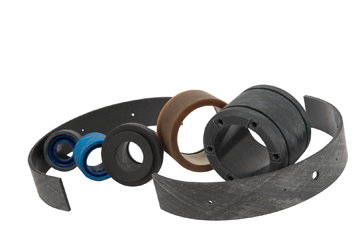Polygon PolyLube composite bearings
Polygon Company announced its line of PolyLube high-performance custom-engineered and standard composite plain bearings (bushings).
 Polygon says they are ideal for challenging applications in construction and mining equipment such as wheel loaders, excavators, back hoes, and compact track loaders, as well as other applications requiring pivot joints with a very long life expectancy. Featuring high load-bearing capacity, low frictional values, and corrosion resistance, the Polygon composite bearings are self-lubricated, requiring no greasing. This reduces maintenance labor costs and increases the maintenance interval before maintenance is required on rental equipment. It can also lower the number of greasing locations, ultimately resulting in fewer equipment warrantee claims.
Polygon says they are ideal for challenging applications in construction and mining equipment such as wheel loaders, excavators, back hoes, and compact track loaders, as well as other applications requiring pivot joints with a very long life expectancy. Featuring high load-bearing capacity, low frictional values, and corrosion resistance, the Polygon composite bearings are self-lubricated, requiring no greasing. This reduces maintenance labor costs and increases the maintenance interval before maintenance is required on rental equipment. It can also lower the number of greasing locations, ultimately resulting in fewer equipment warrantee claims.
Polygon composite bearings are also an excellent choice for high-cycle agricultural equipment, including implements, foraging and harvesting equipment, applicators, carts, and spreaders. The greaseless bearings also help maintain cleanliness inside warehouses, avoiding any potential contamination of the work area by pallet lifting equipment.
Polygon composite bearings are made of continuous filament-wound glass fibers, polymer resins, and polytetrafluoroethylene (PTFE) fabric liners. The fiberglass filament and epoxy resin combine together to form a high strength backing. This precise filament-wound fiberglass structure allows for thin-walled, lightweight bearings. The bearings are typically retained through outside diameter (OD) interference fit. Experts tailor material to fit custom requirements and provide engineering consultation and expertise.
The field retrofittable Polygon bearings can replace existing metallic bushings without changing mating parts, so they can be used to improve wear material without requiring complete equipment redesign. Availability of small-batch/short-run drop-in replacements means customers can increase bushing OD and length without a large tooling investment.
Working closely to help determine the right product for the application, Polygon engineers specify the proper bearing dimensions for the given available space, interference fit, clearance fit, and any limiting factors associated with retention, bearing OD/ID, axial stress, and hoop stress.












